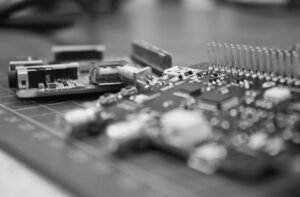Applications of AI
Unlocking the Power of Artificial Intelligence
Artificial Intelligence (AI) has revolutionized multiple industries by enabling machines to simulate human intelligence and perform complex tasks. From self-driving cars to virtual assistants, AI is being widely adopted and integrated into various applications. With advancements in machine learning algorithms and big data, AI has the potential to transform numerous sectors, leading to increased efficiency and innovation.
Key Takeaways
- AI is a rapidly growing field that allows machines to perform intelligent tasks.
- It has diverse applications across industries, including healthcare, finance, and transportation.
- AI can improve efficiency, reduce costs, and enhance decision-making processes.
Applications Across Industries
AI is being implemented in various industries, transforming how businesses operate and revolutionizing customer experiences.
1. Healthcare
In the healthcare sector, AI is helping doctors diagnose diseases with greater accuracy by analyzing medical images and patient data. *AI-powered chatbots provide 24/7 support for patients, offering medical advice and reducing the strain on healthcare providers.*
2. Finance
The financial industry benefits from AI through algorithms that can predict market trends, automate trades, and manage risks. This technology enables faster and more accurate fraud detection, reducing financial losses for individuals and organizations. *AI-powered virtual assistants enhance personalized financial planning and customer service.*
3. Transportation
Autonomous vehicles are a prominent application of AI in the transportation sector. They use sensors, cameras, and deep learning algorithms to navigate roads, improving road safety and reducing accidents. *AI can also optimize transportation routes for logistics companies, saving time and resources.*
Data-Driven Decision Making
AI leverages big data to make data-driven decisions and predictions, providing valuable insights that can shape business strategies.
1. Personalization
AI algorithms analyze user data to personalize recommendations and advertisements, enhancing customer experiences and increasing engagement. *This allows companies to target specific customer segments with tailored marketing strategies.*
2. Predictive Analytics
Through predictive analytics, AI can anticipate future behavior and trends, helping businesses make proactive decisions. This is particularly beneficial in demand forecasting, resource management, and risk assessment.
Impact of AI on Employment
The implementation of AI technologies has raised concerns about job displacement. While some roles may become automated, AI also creates new job opportunities and improves overall efficiency.
1. Job Automation
Repetitive tasks that can be performed by AI are increasingly being automated, reducing the need for human intervention. However, this enables individuals to focus on more creative and complex roles, where human skills are required.
2. New Job Roles
The rise of AI has led to the emergence of new job roles such as AI trainers, data scientists, and AI ethicists. These roles involve developing, managing, and ensuring the ethical use of AI technologies.
Interesting Data Points
| Industry | AI Applications |
|---|---|
| Healthcare | Diagnostic assistance, virtual patient support |
| Finance | Trading automation, fraud detection |
| Transportation | Autonomous vehicles, route optimization |
| AI Benefits | Statistics |
|---|---|
| Improved Efficiency | AI can automate up to 45% of tasks in the manufacturing industry. |
| Cost Reduction | By 2030, AI technologies are estimated to generate $15.7 trillion in value across industries. |
| Enhanced Decision-Making | AI-based decision support systems are found to increase accuracy by 30%. |
| AI Job Roles | Skills Required |
|---|---|
| AI Trainers | Knowledge of machine learning, data analysis, and programming |
| Data Scientists | Statistical analysis, data mining, and problem-solving skills |
| AI Ethicists | Ethics, legal knowledge, and ability to analyze the societal impact of AI |
As AI continues to evolve and adapt, it will undoubtedly transform numerous industries, revolutionizing the way businesses operate and impacting society as a whole. The potential of AI is vast, and its applications are limited only by our creativity and the ethical considerations we put in place to guide its development and use.

Common Misconceptions
Misconception 1: AI will completely replace human jobs
One common misconception about AI is that it will completely eliminate the need for human workers. While AI does have the potential to automate certain tasks and streamline processes, it is unlikely to completely replace human jobs. Some key points to consider are:
- AI is more effective at performing repetitive and mundane tasks, freeing up time for employees to focus on more complex and creative work.
- AI requires human oversight and intervention to ensure accurate and ethical decision-making.
- The introduction of AI often leads to the creation of new job roles and opportunities.
Misconception 2: AI is solely focused on autonomous robots
Another misconception is that AI is solely focused on building autonomous robots or human-like beings. While robots are one application of AI, it is just a small fraction of what AI can do. Some important points to note are:
- AI encompasses a wide range of technologies and techniques, including machine learning, natural language processing, computer vision, and more.
- AI is used in various industries, such as healthcare, finance, cybersecurity, transportation, and customer service.
- AI is employed in tasks like data analysis and prediction, decision-making support, and personalized recommendations.
Misconception 3: AI is infallible and cannot make mistakes
Many people believe that AI is infallible and incapable of making mistakes. However, AI systems are still prone to errors and limitations. It is essential to understand the following points:
- AI algorithms can be biased and reflect the biases present in the data they are trained on.
- AI systems may struggle with making accurate predictions or decisions when faced with unfamiliar or unexpected scenarios.
- Regular monitoring and updating of AI systems are necessary to address issues and improve their performance.
Misconception 4: AI will lead to a dystopian future
There is a common fear that AI will result in a dystopian future where machines take over humanity. While it is essential to consider the ethical implications of AI, the widespread belief that AI will inevitably lead to a negative outcome is a misconception. Some important points to remember are:
- The development and usage of AI are regulated by ethical guidelines and frameworks to ensure responsible and beneficial outcomes.
- AI is a tool that can be used for both positive and negative purposes, depending on its intent and application.
- The responsibility lies with humans to shape the future of AI in a manner that aligns with the best interests of society.
Misconception 5: AI possesses human-like intelligence
One of the most prevalent myths about AI is that it possesses human-like intelligence. In reality, AI is designed to excel in specific tasks but often lacks the broader understanding and adaptability of human intelligence. Key points to consider are:
- AI systems are usually developed to perform a specific function rather than to replicate general human intelligence.
- While AI can surpass humans in certain specialized tasks, it doesn’t possess consciousness, emotions, or reasoning abilities at the level of human intelligence.
- The goal of AI is to complement human abilities and enhance our capabilities rather than replacing human intelligence entirely.

Applications of AI in Banking
The table below illustrates various applications of artificial intelligence in the banking industry. As technology continues to advance, AI is being increasingly utilized to streamline operations, enhance customer experiences, and improve decision-making processes within the financial sector.
| Application | Benefits |
|---|---|
| Fraud detection | Reduces fraudulent transactions by analyzing patterns and behaviors. |
| Chatbots | Assist customers with simple inquiries and provide personalized recommendations. |
| Smart document processing | Automates data extraction, reducing manual errors and improving efficiency. |
| Risk assessment | Utilizes predictive analytics to assess credit risk and make informed lending decisions. |
| Customer segmentation | Segments customers based on behavior, enabling targeted marketing campaigns. |
Applications of AI in Healthcare
The following table highlights some of the ways artificial intelligence is applied in the healthcare industry. With the potential to revolutionize disease diagnosis, treatment plans, and patient care, AI is advancing medical practices and improving overall outcomes.
| Application | Benefits |
|---|---|
| Medical imaging analysis | Aids in the detection and diagnosis of diseases from radiology images. |
| Drug discovery | Accelerates the development of new pharmaceuticals through data analysis and predictive modeling. |
| Virtual health assistants | Provides personalized healthcare guidance and reminders to patients. |
| Genomic analysis | Assists in identifying disease risks and designing targeted treatments based on genetic information. |
| Healthcare chatbots | Offers triage support, answers basic medical questions, and schedules appointments. |
Applications of AI in Transportation
In the field of transportation, artificial intelligence is reshaping how people and goods move from one place to another. This table outlines some of the key applications of AI in the transportation industry, spanning from autonomous vehicles to optimizing traffic flow.
| Application | Benefits |
|---|---|
| Autonomous vehicles | Potential to enhance road safety and reduce traffic congestion. |
| Traffic management | Optimizes traffic flow and reduces bottlenecks through real-time analysis. |
| Predictive maintenance | Anticipates equipment failures and schedules maintenance, minimizing disruptions. |
| Route optimization | Determines the most efficient routes for vehicles, minimizing travel time and fuel consumption. |
| Smart intersections | Uses AI-based algorithms to improve intersection safety and reduce accidents. |
Applications of AI in Retail
The retail industry embraces artificial intelligence to enhance the customer experience, optimize inventory management, and personalize marketing strategies. The table below showcases various AI applications in the retail sector, providing insights into the benefits they offer.
| Application | Benefits |
|---|---|
| Personalized recommendations | Increases sales by offering tailored product suggestions based on customers’ preferences. |
| Inventory management | Optimizes stock levels, reducing excess inventory and minimizing out-of-stock situations. |
| Visual search | Allows customers to find products by using images instead of text-based searches. |
| Price optimization | Determines optimal pricing strategies based on demand, competition, and historical data. |
| Chatbots for customer service | Provides 24/7 support, answers queries, and assists customers with their purchasing decisions. |
Applications of AI in Education
Artificial intelligence is transforming the education sector by personalizing learning experiences, automating administrative tasks, and analyzing student data. The table below highlights various AI applications in education, shedding light on their benefits and potential impact.
| Application | Benefits |
|---|---|
| Intelligent tutoring systems | Provides personalized instruction and feedback to students, enhancing learning outcomes. |
| Automated grading | Reduces teachers’ workload by automatically assessing assignments and providing feedback. |
| Adaptive learning platforms | Adjusts learning materials and activities based on students’ individual strengths and weaknesses. |
| Plagiarism detection | Identifies instances of academic dishonesty by comparing student work against online sources. |
| Virtual simulations | Allows students to practice real-world skills in a safe, immersive environment. |
Applications of AI in Manufacturing
In the manufacturing industry, artificial intelligence plays a vital role in improving operational efficiency, quality control, and predictive maintenance. The table below showcases some of the key AI applications in manufacturing, highlighting the benefits they offer to companies in this sector.
| Application | Benefits |
|---|---|
| Quality control | Detects defects and anomalies in real-time, ensuring product quality. |
| Robotic process automation | Automates repetitive tasks, increasing efficiency and reducing errors. |
| Predictive maintenance | Anticipates equipment failures, reducing downtime and optimizing maintenance schedules. |
| Supply chain optimization | Improves inventory management, demand forecasting, and logistics operations. |
| Smart manufacturing | Uses AI to optimize production processes, resource allocation, and energy consumption. |
Applications of AI in Agriculture
In the agricultural sector, artificial intelligence is revolutionizing farming practices, precision agriculture, and crop management. The table below highlights some of the applications of AI in agriculture, illustrating the benefits they bring to farmers and the industry as a whole.
| Application | Benefits |
|---|---|
| Crop monitoring | Enables early detection of pests, diseases, and nutrient deficiencies. |
| Precision irrigation | Optimizes water usage and ensures plants receive the right amount of moisture. |
| Automated harvesting | Improves efficiency by automatically harvesting crops at optimal times. |
| Soil analysis | Assists in soil mapping, nutrient management, and soil health assessment. |
| Predictive analytics | Forecasts crop yields, assesses market conditions, and supports decision-making processes. |
Applications of AI in Entertainment
The entertainment industry harnesses the power of artificial intelligence to enhance user experiences, personalize content recommendations, and create lifelike virtual characters. The table below showcases some of the key AI applications in the entertainment sector, providing insights into their advantages.
| Application | Benefits |
|---|---|
| Content recommendations | Delivers personalized suggestions to users based on their preferences and viewing habits. |
| Virtual reality (VR) | Creates immersive, interactive experiences that transport users to virtual worlds. |
| Emotion recognition | Analyzes facial expressions or responses to tailor content and improve user engagement. |
| AI-generated music | Develops original compositions using machine learning algorithms. |
| Character animation | Brings virtual characters to life with natural movements and behaviors. |
Applications of AI in Security
Artificial intelligence plays an increasingly significant role in enhancing security measures, both in physical and digital contexts. The table below highlights various AI applications in security, providing insights into their benefits and contributions to safeguarding individuals, organizations, and critical infrastructure.
| Application | Benefits |
|---|---|
| Facial recognition | Identifies individuals based on facial features, enhancing access control and surveillance systems. |
| Behavioral analytics | Identifies anomalies and suspicious activities by analyzing patterns and behaviors. |
| Cybersecurity | Detects and mitigates cyber threats by analyzing network traffic and user behavior. |
| Public safety monitoring | Monitors public spaces for potential security threats, aiding law enforcement agencies. |
| Intelligent video surveillance | Automatically detects suspicious activities and alerts security personnel in real-time. |
Artificial intelligence has permeated numerous industries, revolutionizing processes, improving efficiencies, and enabling new possibilities. From banking and healthcare to transportation and entertainment, these tables demonstrate the diverse applications and tangible benefits of AI. As technology continues to evolve, further advancements in artificial intelligence are expected, promising to shape the future across a multitude of sectors.
Applications of AI – Frequently Asked Questions
Q: What are the different applications of AI?
A: AI has numerous applications such as autonomous vehicles, medical diagnosis, virtual assistants, fraud detection, robotics, natural language processing, and more.
Q: How is AI used in autonomous vehicles?
A: AI in autonomous vehicles helps with functions like object detection, lane changing, collision avoidance, and decision-making based on real-time information.
Q: Can AI be used in medical diagnosis?
A: Yes, AI can assist doctors in medical diagnosis by analyzing large sets of medical data, recognizing patterns, and providing accurate predictions or recommendations.
Q: What role does AI play in the field of robotics?
A: AI enables robots to perform complex tasks in various industries, including manufacturing, healthcare, and agriculture. It helps them adapt to changing environments and make intelligent decisions.
Q: How does AI contribute to fraud detection?
A: AI algorithms can analyze large amounts of data and detect patterns that indicate fraudulent activities, helping to identify potential threats and prevent financial losses.
Q: Can AI-powered virtual assistants understand natural language?
A: Yes, AI-powered virtual assistants like Siri, Alexa, and Google Assistant are designed to understand and respond to natural language inputs, making them capable of performing tasks and answering questions.
Q: What are the practical applications of natural language processing (NLP)?
A: NLP, a subfield of AI, is used in various applications such as sentiment analysis, speech recognition, language translation, text summarization, and chatbots.
Q: How is AI transforming the healthcare industry?
A: AI is revolutionizing healthcare by improving diagnostics, predicting diseases, personalizing treatments, and managing patient data more efficiently, leading to better patient outcomes.
Q: What are some examples of AI in customer service?
A: Chatbots and virtual assistants powered by AI are increasingly used in customer service to provide instant support, handle inquiries, and even process transactions, enhancing overall customer experience.
Q: Can AI be applied to enhance cybersecurity?
A: Yes, AI is employed in cybersecurity to detect and respond to potential threats, identify anomalies in network traffic, analyze behavior patterns, and strengthen overall defense mechanisms.





